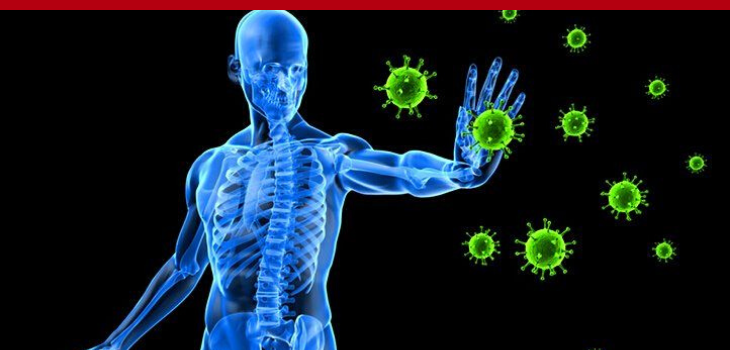It’s been a crazy couple of weeks right?
I bet what was bothering you before seems like small potatoes now while we wait to see how he COVID-19 pandemic unfolds across the world.
I hope you’ve been managing well given the rapid changes that have happened. And I hope your family is doing well too.
It’s been interesting to observe how people respond.
We’ve seen a lot of people who’ve literally been watching the news every second of the day high on stress hormones and fear. We’ve also observed a lot of folks on the other end of the spectrum…Folks who seem to be in total denial. You know…the “it’s just the flu” folks.
Ideally, you should avoid being on either end of these spectrums. Neither in denial, nor panicked.
The sweet spot is in the middle.
As the stoic philosopher Epictetus once said, “The more we value things outside
of our control, the less control we have”.
That’s why it critical to focus on the things in our life that we can control.
That’s why my team and I created this quick guide called “What Successful People Do During A Pandemic—How To Stay Healthy & Supercharge Your Immune System”.
This guide covers the best science-backed ways for boosting your immune system during this pandemic, and much more.
So, let’s get started. Keep reading and get ready to take notes.
As the corona virus SARS-CoV-2 spreads worldwide, our immune systems can use all the help we can give them.
You’ve probably seen people who promote ridiculousness like specific diets or supplements like colloidal silver for fighting off viral infections.
On the other side, you get people who claim that here’s nothing you can do to boost your immune system and everyone who says otherwise is wrong.
As with most things, the truth lies somewhere in the middle.
So I’ve created this guide for you. It contains scientifically proven ways to boost your immune system function.
However, it’s important to understand that there are no proven ways to protect yourself against the corona virus and the disease that it causes (i.e. COVID-19) because it’s a new threat.
So stay away from people claiming that a certain diet, supplement, etc. works to prevent infection. That’s pure BS.
That said, previous research has shown that specific behaviors, foods, and nutrients do have a bolstering effect on your immune system.
Let’s dive into those now.
STEP #1. WASH YOUR HANDS REGULARLY AND DON’T TOUCH YOUR FACE

If you see the physical structure of a virus, it looks like a baseball with spikes coming out of it. Those spikes are how it attaches to the target tissue and causes infection. In the case of this particular coronavirus, it targets lung tissue.
A photo of the SARS-CoV-2 virus (a.k.a. “the coronavirus”).
But as you can see, it doesn’t have feet or wings so it needs your help to move it to your lungs, so it can create infection.
One of the most common ways we help viruses to infect us, is for us to touch a contaminated surface or contact with an infected person. Then we end up touching our faces, rubbing our eyes, etc. and give bacteria and viruses the entryway they need to infect us.
No need to wear gloves because gloves can transmit the virus as easily as bare hands. The virus can’t hurt you if it’s on your skin because it can’t penetrate it.
It’s when we touch our eyes, nose, and mouth that it infects us. So washing your hands and being mindful to avoid touching your face are the way to go.
While it’s arguable that living in sterile condition for the long-term is helpful for your immune system (there’s actually evidence that it’s not), while a virus is spreading this is a proven way to kill the virus.
Make sure you wash your hands with soap for 30-seconds at least or use a hand sanitizer with 60% alcohol (or more) as that will kill the virus on your hands.
STEP #2. STAY AWAY FROM SICK PEOPLE (AND CONSIDER WEARING A MASK WHEN YOU GO OUT)
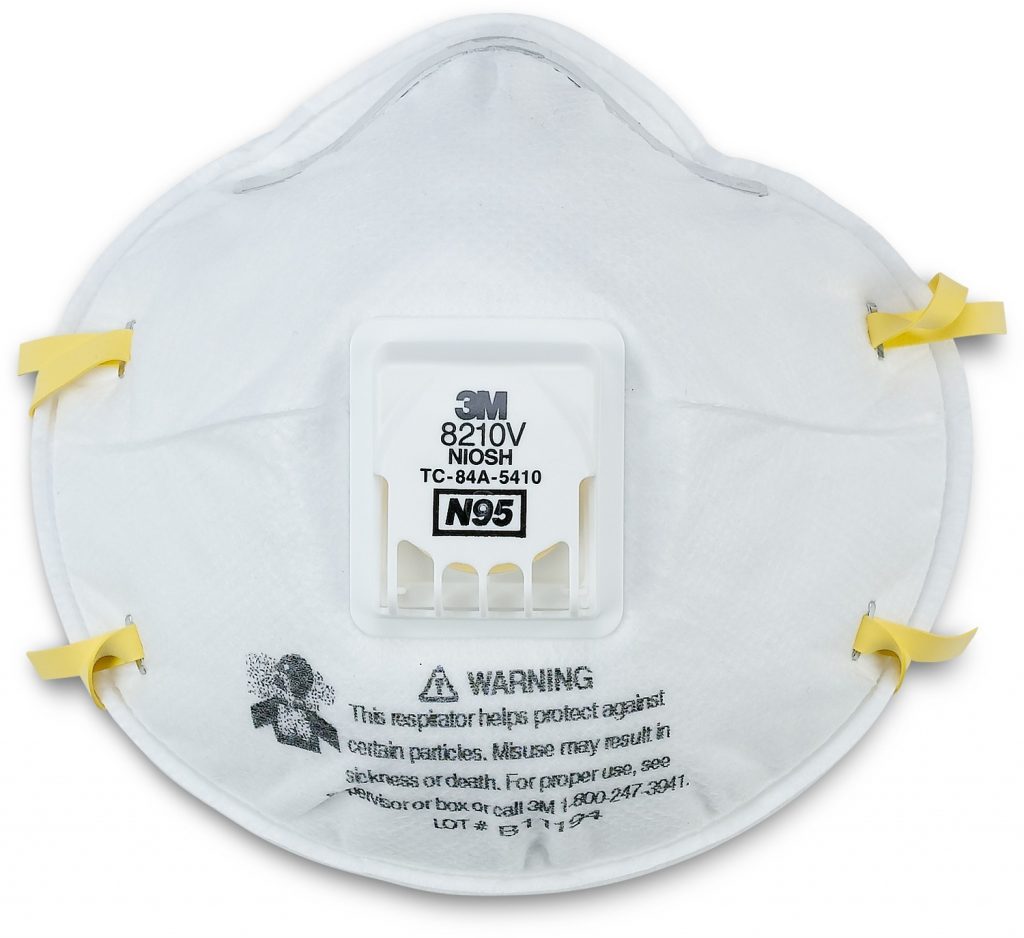
A photo of a N-95 facemask from 3M.
Another way that we help viruses to spread is by being in close proximity with sick people. Sick people cough and touch things. Then you breathe in the droplets or touch the infected surfaces.
That’s why governments around the world have banned entry into their countries and/or implemented quarantine procedures and other efforts to isolate people from each other.
In the case of the coronavirus, many people are infected but don’t know it due to the incubation period and the fact that some people’s symptoms are quite mild.
So by increasing how many people you’re around, you’re also increasing your chances of catching the virus.
So limiting the number of people you’re around will limit the chances of you contracting the virus.
Although the CDC is not recommending that people use facemasks to protect themselves, facemasks actually will protect you—if you get the right one.
The N-95 facemask will prevent you from breathing in the virus. But don’t bother with the surgical facemasks because they’re not sealed.
Keep in mind that you don’t need to buy a year’s supply of facemasks. One for each family member will do.
Think about the mass hysteria with toilet paper.
Healthcare professionals need masks to protect themselves while helping sick patients to get better. So please protect yourself and your family but act responsibly.
STEP #3. GET YOUR WORKOUTS IN
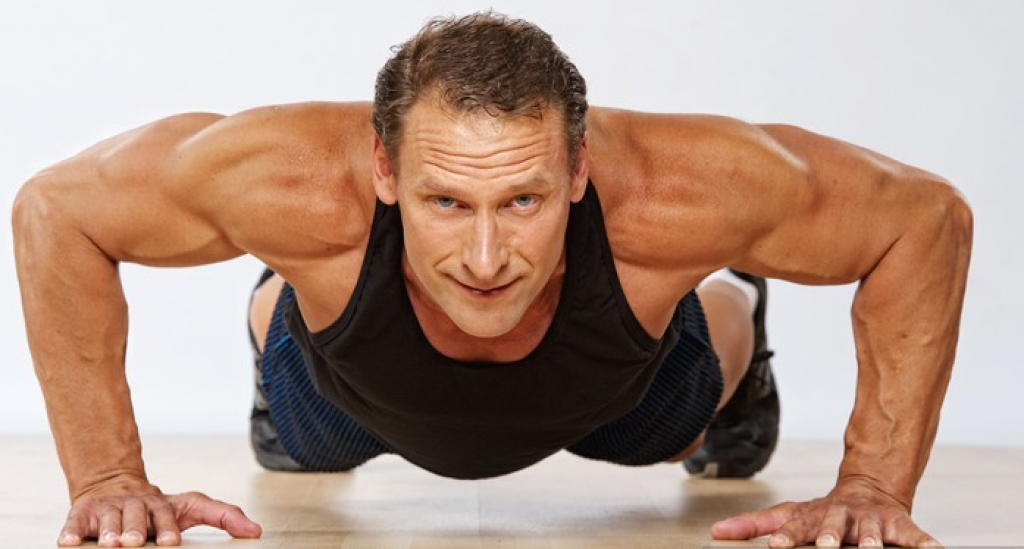
A common question for people who exercise is:
“Should I workout or will it compromise my immune system?”
Good question.
While exercise over 90 minutes can temporarily lower immune system function, it’s not clear whether these changes actually increase your susceptibility to getting sick.
And these immune-suppressing effects lessen the more consistently your workout.
Actually the evidence shows that consistent, long-term training has been shown to protect against disease and chronic inflammation.
So keeping up with your workouts or beginning a workout routine is something that has been proven to help your immune system.
Although not backed by science, the guidelines that have worked well for my clients and me are to avoid workouts if you have a sore throat or any type of respiratory issue.
Going to the gym is an issue, as many of them will close to help prevent the spread of the coronavirus.
And obviously stay away from gyms if you’re sick to avoid spreading whatever it is that you have.
This is where home workouts can come in handy.
STEP #4. FOCUS ON EATING FOODS THAT CONTAIN VITAMIN C (AND POSSIBLY SUPPLEMENT)

I know it’s no newsflash but eating foods rich in vitamins and minerals is good for your health. In particular, foods rich in Vitamin C have been found in multiple studies to protect against the common cold virus, influenza and other respiratory conditions.
So which foods have the most Vitamin C?
Fruits and vegetables are the best sources of vitamin C. Fruits like oranges, kiwifruit and strawberries are especially rich in Vitamin C. Vegetables like red and green bell peppers, broccoli, and Brussels sprouts are high in Vitamin C as well.
Check out this table for the Vitamin C content of common foods:
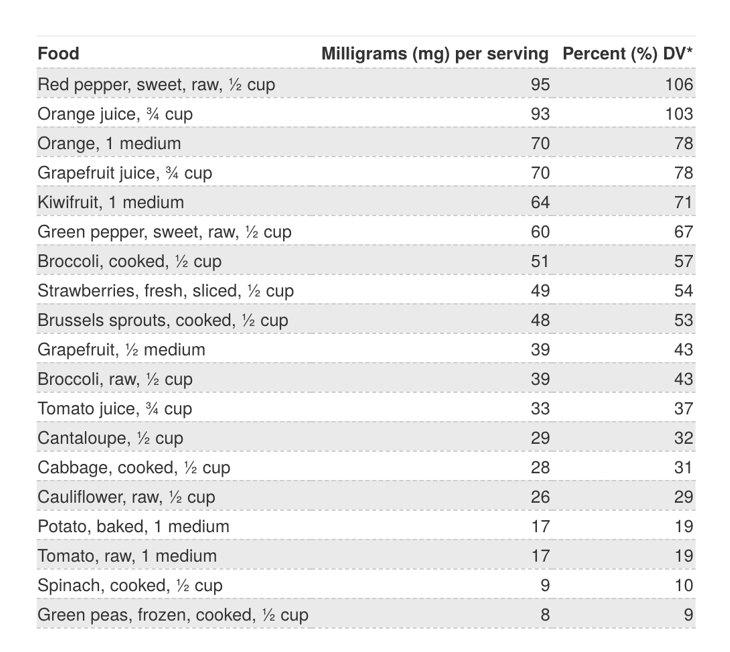 Image Source: National Institutes of Health
Image Source: National Institutes of Health
Should you take Vitamin C supplements to ward off sickness?
Another great question. Let’s dive into the evidence to answer this.
A 2007 Cochrane review examined several randomized controlled trials (the gold standard of research) involving the use of at least 200 mg/day vitamin C taken in three situations:
- Taken consistently as part of a supplement regimen.
- As a prophylactic to prevent getting a cold.
- After the onset of cold symptoms.
The review found that vitamin C supplementation did not significantly reduce the risk of getting a cold in the general population (i.e. sedentary, out-of-shape people who don’ exercise). In the general population, use of vitamin C modestly reduced cold duration by 8% in adults and 14% in children.
However, for those people involved in extreme exercise or cold environments (i.e. endurance athletes, skiers, and soldiers), doses ranging from 250 mg/day to 1 g/day reduced cold incidence by 50%.
He study also found that taking Vitamin C after you’re already sick didn’t shorten the duration of sickness or reduce the severity of symptoms.
So should you supplement or not?
Due to the cost-effectiveness and non-toxic nature of Vitamin C, I think it’s worth using during a time when a contagious virus is spreading and we’re all trying to avoid getting sick. It’s even more important if you exercise hard and/or expose yourself to extreme temperatures.
So how much should you take and when should you take it?
Personally, I take 1 gram a day in divided doses and recommend that my clients do the same. Just keep in mind you have to start taking it BEFORE you get sick to work.
STEP #5. FOCUS ON EATING FOODS THAT CONTAIN ZINC (AND CONSIDER SUPPLEMENTATION)
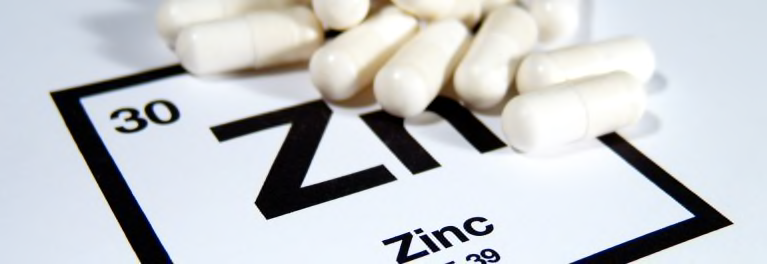
In addition to its other roles, zinc plays a crucial role in immune system function. It’s well established that low zinc levels impair immune system function.
And multiple studies have shown that if your blood zinc levels are low, you can boost your immune function by raising your zinc levels.
However, it’s hard to detect zinc deficiency with lab tests because of the way zinc is distributed in the different tissues of your body.
Plasma or serum zinc levels are the most commonly used tests for evaluating zinc deficiency, but these levels don’t necessarily tell you how much zinc you have in your cells.
So it’s best to focus on eating zinc-rich foods to make sure you’re getting enough of this immune-system booting mineral.
So how much zinc do you need?
The recommended daily allowance (RDA) for zinc 11mg/day for men and 8mg/day for women. If you’re a woman who’s pregnant or lactating, you’ll need a little more zinc, 11mg/day and 12mg/day respectively.
So which foods have the most zinc?
Oysters are loaded with zinc and contain 74mg per a 3oz serving. All other foods pale in comparison to the zinc content of oysters. But if you have a seafood allergy or you can’t stomach oysters, refer to the table below for the zinc content of common foods:
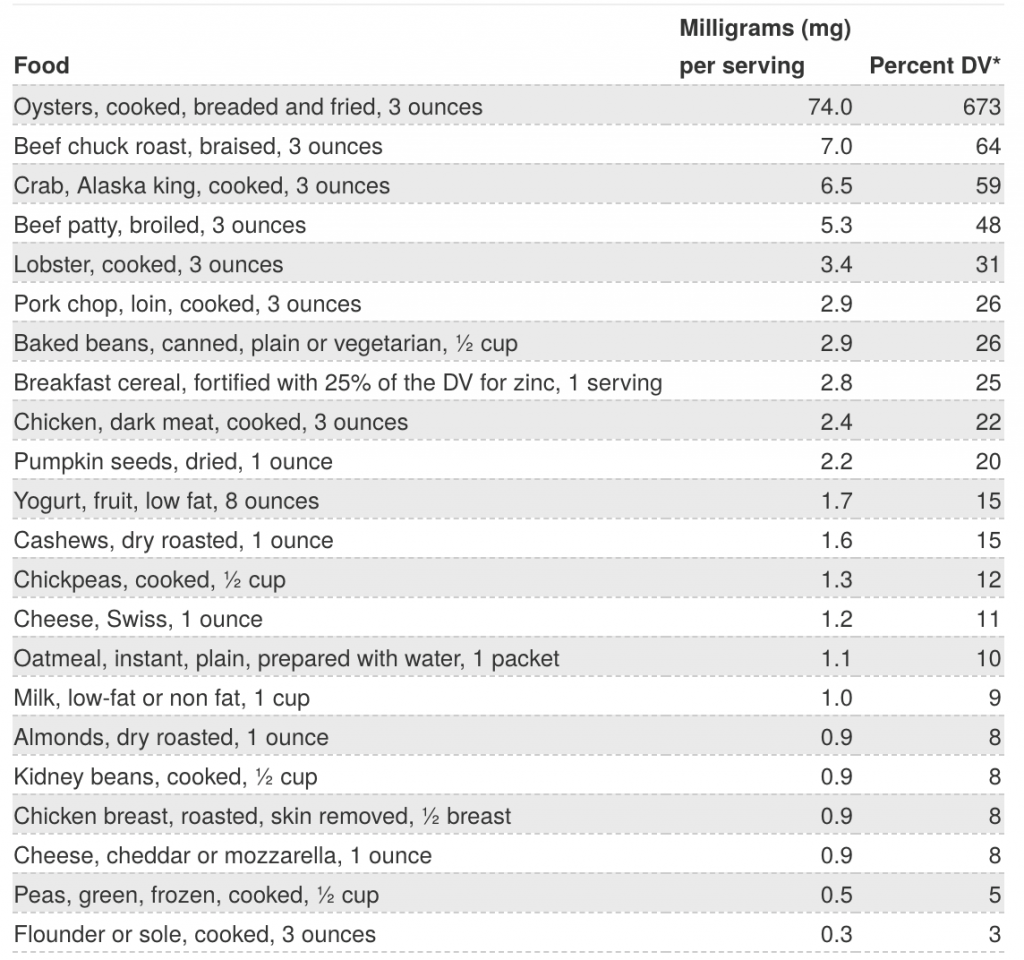
Image Source: National Institutes of Health
Keep in mind that animal products are better sources of zinc than breads, cereals and legumes. These foods contain phytates, which bind to zinc and block your body’s ability to absorb it. So stick with animal sources when possible.
Should you take a zinc supplement?
If you’re in a group hat is at high-risk for zinc deficiency, it might help to take a supplement to bring your zinc levels up. Elderly, people with digestive disorders, heavy drinkers, and people who eat nutrient-poor diets are all at higher risk for suboptimal levels of zinc or even a full-blown deficiency. By tracking your food intake, you can get an idea of what your zinc levels are without getting a test.
That said, if you’re interested in fighting off sickness that you feel is coming on, zinc lozenge supplements are the way to go. Lozenges are better than oral zinc supplements because lozenges deliver the zinc in a form that allows for prolonged contact with the mucus membrane around the throat and sinuses.
For maximum effectiveness, you want that lozenge to takes 20-30 minutes to dissolve and you want a form of zinc that causes an astringent drying sensation in the mouth.
And not all forms of zinc lozenges are equal in their flu-fighting ability either.
For example, a comprehensive review of the research has found zinc acetate outperformed zinc gluconate for shortening the time it takes to recover from a cold.
Another review of several studies found that patients who took zinc acetate lozenges recovered from their cold 3-times faster compared to those who took the placebo. It was also discovered that 70% of the patients taking zinc acetate lozenges were fully recovered by the 5th day. In contrast, only 27% of the placebo-taking patients were recovered by the 5th day.
STEP #6. MAINTAIN ADEQUATE VITAMIN D LEVELS
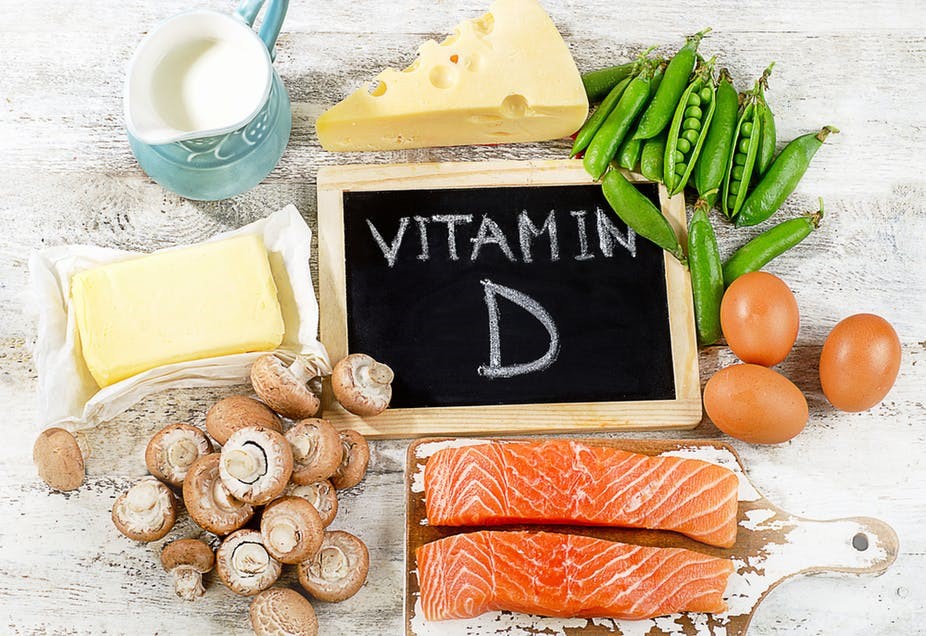
Vitamin D is a fat-soluble nutrient that is critical for survival and optimal health. It is naturally produced through direct exposure to the sun and is found in very few foods.
Optimal levels of vitamin D:
- Promote calcium absorption in the gut
- Reduce inflammation
- Improve sleep quality
- Boosts immune function
Recent research has linked low vitamin D levels and a higher risk of viral infections. If you’re deficient in vitamin D, you may have a less robust immune system to fight off colds and the flu.
A 2010 study published in the American Journal of Clinical Nutrition investigated the effects of vitamin D supplements on schoolchildren during flu season. Only 10% of the children taking vitamin D supplements developed the flu, while almost twenty percent of the kids in the placebo group got sick.
This suggests that taking vitamin D can cut your risk of developing the flu in half—especially for children. If you have kids, make sure they have appropriate levels of vitamin D.
What about adults? Of course, young children are at a higher risk of developing the flu than adults. But vitamin D levels are important to so many other aspects of health that it makes sense to have optimal levels.
What are optimal Vitamin D levels?
Refer to the table below for the Insitute of Medicine’s guidelines for appropriate Vitamin D levels:
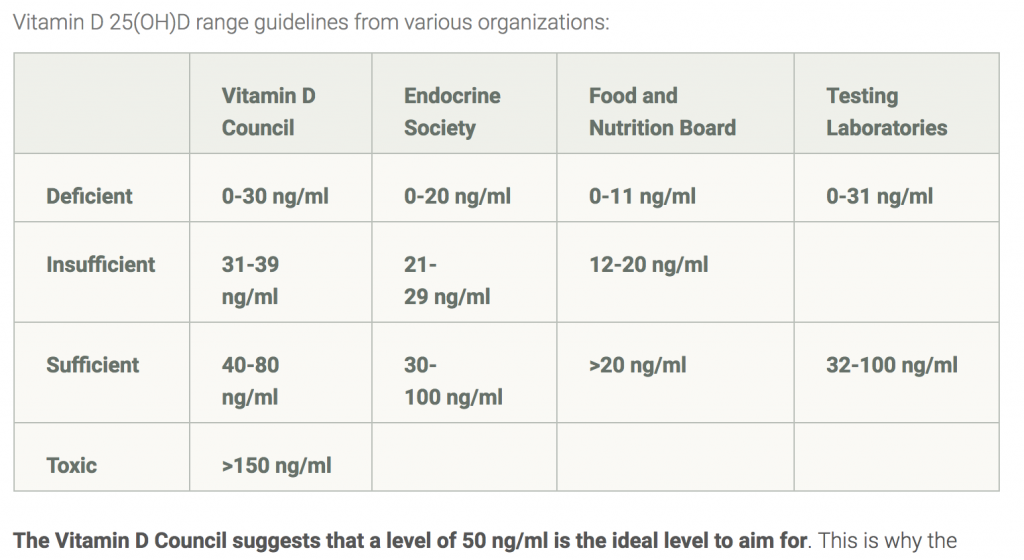
Image Source: Vitamin D Council
As you can see, having the right amount of vitamin D is what you want as having too little or too much can cause issues. The best way to assess your vitamin D status is with a simple blood.
How do I get enough Vitamin D?
When you expose your skin to direct sunlight (specifically UV-B), your skin naturally starts producing vitamin D.
However, seasons, the length of day, cloud cover, smog, sunscreen, and darkness of your skin (melanin) all affect the amount of UV exposure and rate of vitamin D that your body produces.
If you live in a location with a lot of smog or cloudiness, or if you do not get outside often, it’s safe to say that you probably don’t have optimal levels of vitamin D (if you haven’t already had a test done to assess your levels).
Should I take a supplement?
There aren’t many foods that have enough vitamin D to bring up your levels if they’re low. Cod liver oil, swordfish, and salmon contain the highest amounts. See the table below for reference:
 Image Source: National Institutes of Health
Image Source: National Institutes of Health
So my recommendation is that if you’re not getting enough direct sunlight—because of your location, lifestyle or concerns about skin cancer—then it’s best to supplement.
How much Vitamin D should I take?
The first thing to do is to get your vitamin D levels checked. You can do this with a simple blood test at your doctor’s office. You can also order an online Vitamin D test from Discounted Labs or Life Extension.
That way, you have a baseline to measure the effectiveness of your supplement and dose. Serum concentration of 25(OH)D is the best measurement of your vitamin D status. It reflects vitamin D produced by your skin as well as obtained from food and supplements.
Make sure you pay attention to the units as different labs measure vitamin D levels with different units. The two most common units are nmol/L and ng/mL. This can easily throw you off if you’re not paying attention.
That said, you doctor might not want to see you during a pandemic just because you might think your Vitamin D level are inadequate.
So a daily vitamin D intake of 1000–4000 IU (25–100 micrograms) should be enough to ensure optimal blood levels for most people.
But again, you’ll have to get your levels tested to know what effects your supplement is having on your vitamin D status. But it won’t hurt to supplement during this time even if you’re not sure what your levels are.
STEP #7. EAT MORE GARLIC (AND PROPERLY PREPARE IT)

It turns out that garlic is not just for making food delicious and good for repelling vampires. It’s also good for your immune system.
Several studies have found that eating two or more cloves of garlic per day can:
- Boosts immune system function
- Reduces the severity of cold and flu symptoms
- Speed recovery from the cold and flu
How should I eat garlic to get the most benefits?
How you prepare or cook with garlic can alter its medicinal benefits. The enzyme alliinase, which converts alliin into the allicin—the active component of garlic, only works under certain conditions.
A couple of studies have found that 60-seconds of microwaving or 45 minutes in the oven can deactivate alliinase leading to less of the beneficial allicin. The study also found that crushing garlic and allowing it to sit for 10 minutes before cooking can help prevent the loss of its immune-boosting properties. You ca also increase the amount of garlic you use to make up for the los allicin due to cooking.
Here are a few ways to maximize the health benefits of garlic:
- Crush or slice all your garlic before you eat it to increase the allicin content.
- Let your crushed or sliced garlic sit for 10 minutes before cooking with it
- Use more garlic when you cook—several cloves of garlic in each meal is what I personally use.
STEP #8. GET ENOUGH SLEEP

Every year we’re finding out more reasons why sleep is important to your health and maintaining good energy levels. Approximately 50 million to 70 million Americans have either a sleep disorder or habitually insufficient sleep.
And I’m guessing that the stressful current state of affairs isn’t helping if you happen to be one of the people who have an issue getting in your 7-9 hours of quality sleep.
Unfortunately, this makes you even more susceptible to poor immune system function. Significant negative effects on your immune system can be seen after a few days of total sleep deprivation or even several days of poor sleep.
While not all of the changes in immune physiology that occur as a result of sleep deprivation appear to be negative, there is an established connection between respiratory infections and poor sleep.
A 2016 study found that people who slept 5 hours or less were more likely to report a head or chest cold than the study participants who slept for 7 to 8 hours.
So if you’re struggling with sleeping enough or with poor quality sleep, it’s time to dial in your “sleep hygiene” practices. (Sleep hygiene refers to practicing behaviors and setting up your bedroom for optimal sleep.)
I’ve done many episodes and articles on getting good quality sleep. But the best sleep hygiene practices in bullet-style format include:
- Getting natural light in the morning for at least 30 minutes (doesn’t have to be direct sunlight on your skin).
- Go to bed and wake up at the same time every day
- Exercising early in the day
- Avoiding blue light from lamps and screens at night
- Keep your bedroom quiet and cool
- Write down a to-do list before bed
STEP #9. HOARDING TOILET PAPER

This is actually a bleeding-edge immune system-boosting tactic that scientists haven’t caught up with just yet.
But it appears if you buy a shit-ton of toilet paper, it might just protect you from the SARS-CoV-2 virus and the COVID-19 disease it causes.
Ok, so this is just a joke.
Be safe, be smart, and be careful with who you listen to right now. Even me



